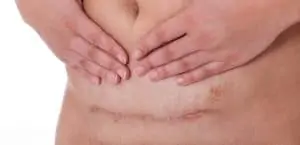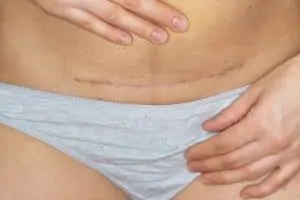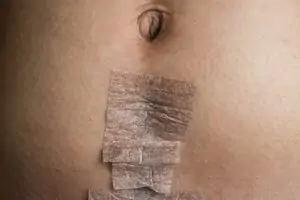Whether you had a cough before or delivered one after your delivery, coughing after a c-section is never fun.
The first time I coughed after my surgery, I thought I would rupture my incision, but I didn’t. However, I was surprised at my level of discomfort. Then, I sneezed for the first time, and the same thing happened.
Who knew that you used your abdominal muscles when you coughed and sneezed?
Also, you might not realize it, but developing a cough after surgery might be a cause for concern. So, let’s take a look at what you should know to be prepared.
Why Does Coughing After a C-Section Hurt?
Before having surgery, you probably had no idea that coughing would cause discomfort, but it quickly becomes clear how uncomfortable it is. The question is, why is this so painful?
When you cough, sneeze, or even laugh, you use abdominal muscles, and those muscles were separated during your surgery. So, the pressure and strain from coughing, sneezing, and laughing lead to severe discomfort or pain.
Is It Safe to Sneeze or Cough After a C-Section?
Yes! There is little you can do to prevent sneezing or coughing; they’re natural parts of our body. While they are painful, if you take the right approach, it’s rather safe for you to sneeze and cough.
One thing you should know is that you should never try to stifle or hold in a sneeze, even though it’s tempting. When you do so, you can rupture blood vessels in your throat, damage your inner ear, or apply too much pressure to your incision site.
Otherwise, you shouldn’t worry too much. The chances of any adverse effects are slim!
Why Is A Cough After Surgery Worrisome?
In ordinary life, coughing isn’t a big deal, but when you’re recovering from surgery, the development of a cough and congestion after a c-section can be worrisome.

Your doctor might advise you to cough after surgery or use an incentive spirometer to suck in the air. While this little device is sometimes annoying, you must keep your lungs clear to reduce the risk of pneumonia. Keeping your lungs clear after surgery is vital!
If you don’t use an incentive spirometer, your doctor might encourage you to cough often to prevent lung complications. Pneumonia is a severe complication, especially after surgery.
How to Cough?
As I said, coughing after your surgery isn’t fun, and you’ll quickly be surprised by the discomfort of one simple act.
When you feel the urge to cough, you need to brace your incision. You can do so either by using your hands or a small pillow and hugging it against your incision. This is the simplest and most practical way to cough after.
Now, don’t apply too much pressure. Just gentle, firm pressure works, and the bracing action reduces the stress placed on the incision site.
The other reason you need to give support is to prevent your incision from pulling apart and opening, which is a severe complication called dehiscence. So, keep a pillow nearby!
How to Determine If Your Cough Is Serious or Not
So, you have a cough, but you aren’t sure if it’s severe.
First, if you had it before you had your surgery, chances are you don’t need to worry. It could be a minor cold or allergies. Sometimes, even the dry air of a hospital can cause an annoying cough after surgery.
If you develop a cough after surgery, it might be a cause for concern if one or more of these signs grow.
- The cough continues to get worse.
- You develop a fear.
- You start to cough up yellow or green phlegm.
- Shortness of breath
- Sweating or shaking chills
- Rapid, shallow breathing
- Loss of appetite
- Sharp or stabbing chest pain
Many of these signs indicate potential pneumonia developed after surgery.
Home Remedies for a Cough After a C-Section
So you have a chesty cough after a c-section, don’t panic. There are some things that you can do to make the discomfort less. Here are some home remedies and suggestions to try.
A Postpartum Belly Binder
While a postpartum belly binder helps with pain and healing, it also keeps the pressure on your incision to make the coughing and to sneeze less painful. The binders give your abdomen constant support, making movement easier.
Generally, you want to find an adjustable and comfortable binder that you can make smaller as your belly naturally deflates over the next few weeks after childbirth. At the same time, the binder will support and protect your incision.
A Humidifier
Humidifiers aren’t just for little kids! They work for adults too. Vaporizers are great for head and chest congestion, especially when symptoms increase in the middle of the night when you need to sleep.
Humidifiers also will help with a dry cough after a c-section. They add moisture into the air, which can kick a cough to the curb.
DeCongestants
If you’re breastfeeding, you do need to take precautions when you pick decongestants or antihistamines. While some are safe and compatible with breastfeeding, many aren’t safe. They’ll quickly dry up your milk supply.
If you aren’t breastfeeding, you can take whatever decongestants you want. It can help make you feel a lot better.
You should avoid using any chest vapor rubs, even though it’s tempting to do so. Newborn babies shouldn’t breathe in the vapors or get it on their skin. Some research suggests that it could affect milk supply as well.
Drink Plenty of Fluid
Fluids are a necessity after surgery and when you have a cough. You aren’t bringing any phlegm up if you notice a terrible tickly cough after a c-section.
Drinking plenty of fluid helps to thin out any mucus. Drinking fluid is necessary if you have mucus in your system that is stuck and needs to break up. Breastfeeding mothers must drink water to keep their milk supply high, or a sudden drop is inevitable to experience.
Honey and Tea
Last but not least, honey and tea might have been your grandmother’s suggestions, but they weren’t without a warrant. We know that honey can help reduce cough frequency in children, so it should be able to help you as well.
Try to Relax
You’re recovering from a c-section, so you need to take it easy and try to relax. If you developed a cough after your surgery, chances are it’s a simple, pesky cold that will go away soon. Watch for signs that it is more serious than you thought, like a fever or the symptoms worsening. That’s when you should seek help.
Hey, this is Linda. My biggest accomplishment in life is being a mother of four children. Their current ages range from almost ten years old down to 20 months old.
I’m passionate about writing parenting articles because I understand so well all of the problems and trials you face as a parent. From breastfeeding woes to budgeting problems and behavior problems, along with everything in between, chances are I’ve faced it over the last ten years. Read more about Linda here.







